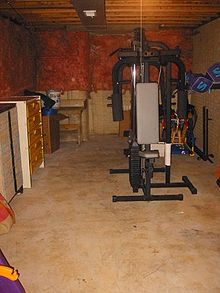**Purpose, Geography, and History:**
– Basements can be used similarly to above-ground floors in buildings.
– Use of basements depends on factors like climate, soil, seismic activity, and real estate economics.
– Basements are standard in many places with continental climates and soft soils.
– Adding a basement can reduce heating and cooling costs.
– Housing density influences the necessity of a basement.
**Types of Basements:**
– Daylight basements provide living space above ground.
– Walk-out basements allow direct egress outdoors.
– Subbasements are floors below the basement floor.
– Finished fully underground cellars are used for storage.
– Underground crawl spaces offer access to pipes and substructures.
**Design and Structural Considerations:**
– Basement walls typically form the foundation of houses.
– In colder climates, basements are necessary below the frost line.
– Excavation methods like backhoes are used to dig basements.
– Water stop, gravel, and French drains prevent water seepage.
– Some designs opt for crawl spaces due to structural challenges.
**Basement Waterproofing and Drainage:**
– Tanking systems physically hold back groundwater.
– Cavity drainage systems divert water to a sump pump.
– Exterior foundation drains are effective at draining water away.
– Waterproofing can be applied to the inside or outside walls.
– Drainage solutions include re-mortaring, silicone sealing, and proper grading.
**Basement Maintenance and Utilities:**
– Basements should be heated and dehumidified.
– Finished basements can be costly to maintain.
– Drains and gutters should be kept clear to prevent flooding.
– Main water cut-off valves are usually located in the basement.
– Heating ducts typically run in the ceiling of the basement.
A basement or cellar is one or more floors of a building that are completely or partly below the ground floor. Especially in residential buildings, it often is used as a utility space for a building, where such items as the furnace, water heater, breaker panel or fuse box, car park, and air-conditioning system are located; so also are amenities such as the electrical system and cable television distribution point. In cities with high property prices, such as London, basements are often fitted out to a high standard and used as living space.




In British English, the word basement is usually used for underground floors of, for example, department stores. The word is usually used with houses when the space below the ground floor is habitable, with windows and (usually) its own access. The word cellar applies to the whole underground level or to any large underground room. A subcellar or subbasement is a level that lies below the basement or cellar.
Definition from ChatGPT:
Basement:
A basement is a floor of a building that is partially or entirely below ground level. It is typically used for storage, utilities, or as an additional living space in a house.